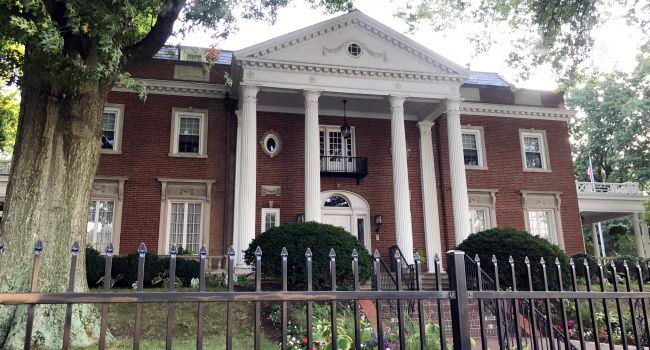CHARLESTON — A judge overseeing a case about where West Virginia’s governor lives wonders how he would enforce an order.
“You want me to compel him to live here?” Kanawha Circuit Judge Charles King asked during a hearing Monday.
“Yes, compel him to live in Charleston,” responded Delegate Isaac Sponaugle, D-Pendleton, who filed a lawsuit contending Gov. Jim Justice hasn’t lived up to the state Constitution’s requirement to live at the seat of government.
“Is that every day of the week?” King asked in response.
“It’s an unequivocal constitutional duty,” Sponaugle said.
King made no ruling Monday morning after a hearing on the residency issue.
But his banter with Sponaugle underscored the potentially complicated nature of enforcing a residency requirement in the Constitution.
Where Justice lives has been an issue since he took office. He continued to make his home in Lewisburg, a couple of hours from the Capitol. He said he works hard no matter where he is and that he can be reached at all hours via his flip phone.
The state Constitution addresses where officers of the executive branch must live: “They shall reside at the seat of government during their terms of office, keep there the public records, books and papers pertaining to their respective offices, and shall perform such duties as may be prescribed by law.”
That applies to the governor, secretary of state, auditor, treasurer, agriculture commissioner and attorney general.
The specific issue before King on Monday morning was a preliminary matter.
Outside counsel for Justice contended Sponaugle failed to provide a legally required 30-day notice for a lawsuit against a state agency. Sponaugle countered that his request is on solid ground.
The judge and the delegate went around and around over broader issues.
“You want me to compel Gov. Justice to live in Charleston,” King repeated. “How many days and nights am I to require him to live here, regardless of what he has to do?
Sponaugle responded, “I want him to follow the Constitution.”
“I want to know what the specifics of the order are,” King said, pressing not for a Constitutional overview but in terms of how he would be expected to express the specific requirements.
“Let’s assume I find he doesn’t live here as much as he should or sleep here. Is it OK if he goes to bed at 11 and gets up at 7 and goes to Lewisburg?”
Sponaugle: “He’s not doing either.”
They eventually moved to the topic of whether a court order is necessary — or whether a political remedy might be available.
“There you go, let’s have another impeachment,” King said, referring to the recent impeachment of West Virginia’s entire Supreme Court.
Again King asked, “How do I enforce it? How am I going to know whether he’s living there or not? You want me to follow him around the rest of his term?”
Sponaugle said, “I’m not asking you to put a bracelet on him.”
After the hearing, lawyer Mike Carey, representing the governor, said the state contends Justice lives up to his obligation.
“We don’t believe the governor is in violation of any constitutional provision,” Carey said. “He’s left to his discretion to implement the requirements of that. He’s in Charleston on many occasions. In fact, just this Saturday when he appointed two new members of the Supreme Court.
“It must be left to the discretion of the constitutional officer to implement that requirement. And the courts will not get involved in requiring a constitutional officer to do certain things in the future.”
Carey went on to say, “I don’t think any court will have any interest in providing oversight to the activities of the governor, who in his discretion performs his duties.”
Also speaking after the hearing, Sponaugle contended that letting the governor live where he wants would open a can of worms about the residencies of other elected officials.
“I could live wherever I want and run for office. State Senate could run wherever they want. Board of Public Works could. Circuit judges could. Because if we’re going to start ignoring provisions for the governor, it’s going to make its way across every elected official,” Sponaugle said.
Sponaugle contended issuing an order to compel the governor to reside at the capital isn’t that complicated.
“Once an order is in effect. it is the obligation of the person who receives the order to follow it, and if they don’t follow that order, then they’re in contempt of court,” Sponaugle said.
“But I think you’ve got to give the benefit of the doubt that if an order comes down, the governor would follow the precedent of the court. He enforces laws. So he’s just going to ignore an order that comes down?”
King alluded to the possibility that his courtroom isn’t the proper venue to settle such matters.
“Maybe one of you ought to take this issue to the Supreme Court,” he said. Then, with some dark humor, he added, “Do we still have a Supreme Court?”




